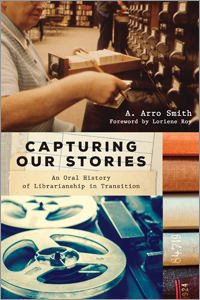Primary tabs
You don't need to be an ALA Member to purchase from the ALA Store, but you'll be asked to create an online account/profile during checkout to proceed. This Web Account is for both Members and non-Members. Note that your ALA Member discount will be applied at the final step of the checkout process.
If you are Tax-Exempt, please verify that your account is currently set up as exempt before placing your order, as our new fulfillment center will need current documentation. Learn how to verify here.
- Description
- Table of Contents
- About the authors
- Reviews
Just as it did for society at large, the second half of the 20th century brought monumental upheaval to librarianship, affecting every aspect of what it means to be a part of the information services profession. But as the librarians who worked during this tumultuous period end their careers, the social memory of their extraordinary generation is at risk of being forgotten. Encompassing a full spectrum of institutions and roles, Smith's important oral history draws from the professional life stories of dozens of librarians to chronicle this transitional period. Captured in stories sure to resonate are the regret and nostalgia for the librarianship practiced at the beginning of their careers, excitement and wonder about how technology has fundamentally changed the profession, and perspectives on the stereotypes associated with librarians. The result is a book as entertaining as it is instructive. Featuring a foreword by Dr. Loriene Roy, it explores such themes as
- becoming librarians, both consciously and accidentally;
- memories of library school and training;
- clichés and stereotypes, both inside and outside the profession;
- what it was like to experience the beginning of the technology revolution, spanning the card catalog era through the age of online database searching, OPACs, and beyond;
- wisdom gleaned from a lifetime of changing technology and obsolescence;
- professional challenges such as sexism and the struggles for promotion, funding, and compensation; and
- inspiring stories of helping patrons, performing outreach, and serving the community.
Providing memories for the contributors' peers and valuable background and context to those just entering the field, this book also offers a primer of oral history theory and methodology for those studying the form.
Foreword
Acknowledgments
Preface: My Story
Part I Our Stories
Introduction
Chapter One Becoming a Librarian
- The Decision to Become a Librarian
- Library School Memories
Chapter Two Cliché and Stereotype
- Use of Cliché
- Stereotype and Cliché
- Discussing the Stereotype
- Stereotypes within the Profession
- Stereotypes outside the Profession
Chapter Three Technology Memories
- Precomputer Technology
- Early Computer Technology
- OPACs
- OCLC
- Online Database Searching
- Some Lessons Learned Regarding New Technologies
- Technology Regrets
- Technology Redemption
Chapter Four Regrets
- Promotion Regrets
- Funding and Compensation
- Sexism
Chapter Five Helping People
Chapter Six The Collective Memory of Librarianship
Part II How to Capture Stories
Chapter Seven A Primer on Oral History Theory and Methodology
- An Introduction to the Methodology: Oral History
- History of the Method
- Criticism of Oral History
- An Introduction to Memory Studies as Theory
- Collective Memory
- Individual Memory and Criticism
- Regret and Nostalgia
- Cliché and Stereotype
- Combining the Theory with the Method
- Librarians at the Intersection of Memory Studies Theory and Oral History
- The "So What?" Question
Chapter Eight Practical Oral History Advice
- A Story about Human Relationships
- A Second Story about Human Relationships
- Starting a Project
- A Final Meditation on Oral History
Bibliography
Index
A. Arro Smith, Ph.D.
A. Arro Smith, Ph.D., technical services manager at the San Marcos (Texas) Public Library, has been a practicing librarian for more than 25 years. He is the author of numerous journal articles and book chapters, including the widely read “Cataloging Heresy,” an essay that appeared in Radical Cataloging by K. R. Roberto (2008). He worked with former ALA president Dr. Loriene Roy, in a partnership between the American Library Association and the School of Information at the University of Texas, to create a national oral history program for retired and retiring librarians.
Dr. Loriene Roy
Dr. Loriene Roy is professor in the School of Information of the University of Texas at Austin, where she teaches graduate classes on public libraries, reference, and library instruction/information literacy. She is founder and director of If I Can Read, I Can Do Anything, a national reading club for Native children. She is Anishinabe, enrolled on the White Earth Reservation, and is a member of the Minnesota Chippewa Tribe. She was elected 2007–2008 president of the American Library Association.
”Useful to scholars of oral tradition, LIS students, and others investigating the historical trajectory of librarianship in the twentieth century."
— ARBA
”Clear and fluid ... the librarians' words shine through and give life to this volume."
— Library Journal
"Somewhere in this offering, any librarian is almost guaranteed to hear his or her own voice ... Librarians could not have asked for a better compilation that encompasses the profession."
— VOYA
”The second part is fresh and interesting with constructive techniques on how to get subjects to give more information and what type of technologies to record them ... This is recommended both for those who are about to undertake work focused heavily on oral history, as well as those librarians who have a particular focus on the history of librarianship and recent changes in the work of the profession."
— Catholic Library World



